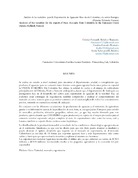Análisis de las variables para la Exportación de Aguacate Hass desde Colombia a la unión Europea (España, Holanda, Francia)
Fecha
2017Autor(es)
Bolaños Chamorro, Cristian FernandoCaicedo Montaño, Catalina
Portilla Bolaños, Sonia Aylen
Director(es)
Rodríguez Domínguez, MarilynMetadatos
Mostrar el registro completo del ítemResumen
Se realiza un estudio a nivel nacional, para encontrar el departamento, ciudad o corregimiento que produzca el aguacate para su comercio tanto interno como para exportar hacia otros países en especial la UNION EUROPEA, En Colombia Sus climas, la calidad de suelos y el empuje de cultivadores principalmente del Oriente, Norte y Suroeste antioqueños, hacen que el departamento de Antioquia sea protagonista hoy en el desarrollo del cultivo para exportación de aguacate de la variedad Has, así podemos crear estrategias de negociación, también comprender y analizar el comportamiento del mercado en estos sectores para su posterior comercio en el exterior aplicando todos los conocimientos previos, teniendo en cuenta la economía de cada país.
En conjunto con las diferentes asociaciones de productoras de aguacate y el ministerio de agricultura gracias a su información acerca de la producción de esta fruta, se escogen países Europeos para estudio de mercadeo, población, ubicación geográfica, cultura etc., ya que hay mucha demanda para este producto, aprovechando que COLOMBIA es gran productor y se espera ser el mayor proveedor para el comercio exterior superando así por completo al resto de exportaciones tales como las rosas, café y banano; también se exporto frutas exóticas como la pitahaya;
La distribución de la producción mundial es resultado de las condiciones climatológicas que prevalecen en el continente Americano, ya que son las ideales para que este fruto pueda alcanzar su madurez y pueda alcanzar el óptimo desarrollo que requiere en el mercado de exportación, en el mercado Colombiano ya son más de 18 firmas que exportan aguacate hass y más departamentos tales como caldas y Antioquia que aprovechan la situación y explotan al máximo sus hectáreas.
Las exportaciones tuvieron lugar muy reconocido el último año, ya que subieron sus ventas de $US10 millones a $US35 millones favoreciendo mucho a los pequeños agricultores y la economía del país exportador.
Abstract
A study is carried out at the national level to find the department, city or township that produces avocado for its internal trade and to export to other countries, especially the EUROPEAN UNION. In Colombia Its climates, soil quality and the growers mainly from the East, North and Southwest Antioquia, make the department of Antioquia is a protagonist today in the development of avocado export cultivation Has, so we can create trading strategies, also understand and analyze market behavior in these sectors for their subsequent foreign trade applying all the previous knowledge, taking into account the economy of each country. Together with the different associations of avocado producers and the Ministry of Agriculture thanks to their information about the production of this fruit, European countries are chosen for marketing study, population, geographical location, culture etc., since there is a lot of demand for this product, taking advantage of the fact that COLOMBIA is a major producer and is expected to be the largest supplier for foreign trade, thus completely surpassing all other exports such as roses, coffee and bananas; exotic fruits such as pitahaya were also exported; The distribution of world production is a result of the climatic conditions prevailing in the American continent, since they are the ideal so that this fruit can reach its maturity and can reach the optimum development that it requires in the export market, in the Colombian market there are already more than 18 companies that export avocado hass and more departments such as Caldas and Antioquia that take advantage of the situation and exploit to the maximum their hectares. Exports took place well over the past year, as sales increased from US $ 10 million to US $ 35 million, greatly favoring small farmers and the economy of the exporting country.

